

Overlords: New Dominants. Progress and Optimism. Privacy and Identity. Unity or Tribalism: The Cultural Promises of Augmented Reality. Cybermobs: Crowd Intelligence. Future Jobs. New Laws for New Technologies. Computer Programs Can Be as Biased as Humans. The Case for Unlimited Tablet Time for Toddlers - Public Health. Hello there!
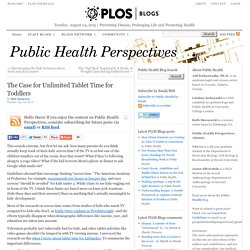
If you enjoy the content on Public Health Perspectives, consider subscribing for future posts via email or RSS feed. This sounds extreme, but first let me ask: how many parents do you think actually keep track of their kids’ screen time? If the TV is on but one of the children wanders out of the room, does that count? What if they’re following along to a yoga video? What if the kid borrows Mom’s phone at dinner to ask Google what snails eat? Guidelines abound that encourage limiting “screen time.” Most of the research on screen time comes from studies of kids who watch TV compared to kids who don’t, as Emily Oster explains at Fivethirtyeight—and the effects typically disappear when demographic differences like income, race, and education are taken into account. Television probably isn’t inherently bad for kids, and other tablet activities like video games shouldn’t be lumped in with TV viewing anyway.
Television is passive: stuff happens, and you get to watch. ‘Screen Time’ For Kids Is Probably Fine. When I was a kid, my parents had strict television rules: no more than an hour a day, and the content must be educational.
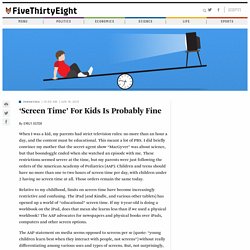
This meant a lot of PBS. I did briefly convince my mother that the secret-agent show “MacGyver” was about science, but that boondoggle ended when she watched an episode with me. These restrictions seemed severe at the time, but my parents were just following the orders of the American Academy of Pediatrics (AAP): Children and teens should have no more than one to two hours of screen time per day, with children under 2 having no screen time at all. Those orders remain the same today. Relative to my childhood, limits on screen time have become increasingly restrictive and confusing. The AAP statement on media seems opposed to screens per se (quote: “young children learn best when they interact with people, not screens”) without really differentiating among various uses and types of screens.
Let’s consider a few examples. The amazing, surprising, Africa-driven demographic future of the Earth, in 9 charts - The Washington Post. Traffic moves through downtown Lagos, Nigeria.
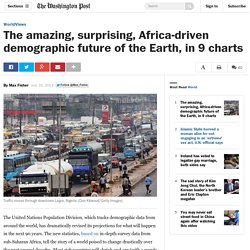
(Dan Kitwood/Getty Images) The United Nations Population Division, which tracks demographic data from around the world, has dramatically revised its projections for what will happen in the next 90 years. The new statistics, based on in-depth survey data from sub-Saharan Africa, tell the story of a world poised to change drastically over the next several decades. Most rich countries will shrink and age (with a couple of important exceptions), poorer countries will expand rapidly and, maybe most significant of all, Africa will see a population explosion nearly unprecedented in human history. 8 Horrifying Things We Do When No One's Looking. When the founders of OkCupid started one of the most popular dating sites on the Internet, they didn't intend to find out all of humanity's deep, dark secrets.

All they wanted was to help people make babies. Google is building 180 satellites to spread internet access worldwide : worldnews. Myths about the Future that Could Ruin Your Life. @FunkyJAU Because they're both the dreams of people who believe the status of society is basically a wrong, and eventually the day is gonna come that we'll get our just desserts.
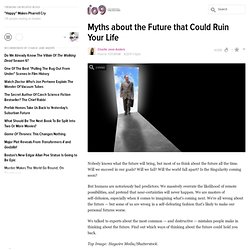
For some heaven, for others Siberia or the firing squads. We're just so happy in our sinfulness/decadence, well, we don't care. On both sides it's kind of like "the world is evil, I'm right, one of these days they're gonna understand how right I was". They're both bitter fantasies against a world they feel rejects them and their values. Education: An End to Fear - Why Students Hate Homework - Extra Credits. What are we unknowingly living in the golden age of? : AskReddit. Misguided Nostalgia for Our Paleo Pasts. By Marlene Zuk The Kobal Collection, Hammer Raquel Welch in One Million Years B.C. (1966) The first thing you have to do to study 4,000-year-old DNA is take off your clothes.
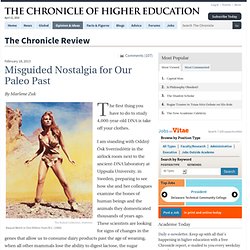
I am standing with Oddný Ósk Sverrisdóttir in the airlock room next to the ancient-DNA laboratory at Uppsala University, in Sweden, preparing to see how she and her colleagues examine the bones of human beings and the animals they domesticated thousands of years ago. These scientists are looking for signs of changes in the genes that allow us to consume dairy products past the age of weaning, when all other mammals lose the ability to digest lactose, the sugar present in milk.
Another perspective to futurology: what do you think YOU personally will be like in the year 2020? : Futurology. Want to close the gender gap? Give men paternity leave. Can Animal Behavior Help Us Understand Empathy and Dehumanization?